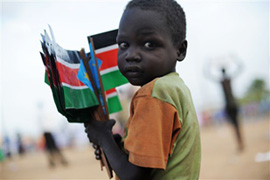Legitimising Khartoum
Many Sudanese fear elections will just serve to embolden Omar al-Bashir, author says.

 |
| Sudanese are voting in their country’s first multi-party elections since 1986 [AFP] |
“Things will be different after the elections,” asserted Ghazi Salahuddin, Sudan’s presidential advisor and chief interlocutor with the US, at the end of a meeting with a delegation from the Save Darfur Coalition of which I was part in February.
He expressed confidently to us that the national elections – the first multi-party elections in Sudan since 1986 – would fundamentally change Sudanese politics for the better.
Since that day, the credibility of the elections has been called into question by the withdrawal of candidates and the boycott of a number of opposition parties.
Rather than serving as a step forward in the long road to peace and democracy, many Sudanese now fear what a newly emboldened regime in Khartoum may mean for the country.
South Sudan
| special report |
 |
Omar al-Bashir, the Sudanese president, and other leaders of the ruling National Congress Party (NCP) have already begun to hint at their post-elections plans – and these signals spell trouble.
Yesterday, on the last day of campaigning, al-Bashir revealed the results of a confidential poll of southern Sudanese. This survey, he said, found that 30 per cent of Southerners would opt for secession in the referendum scheduled for January 2011, while 40 per cent would choose unity.
Such findings staggeringly contradict every other assessment of public opinion in South Sudan, which shows overwhelming support for secession.
This assertion and al-Bashir’s ardent pledge at the rally to campaign vigorously after the elections for unity should raise eyebrows.
Darfur
Campaign statements made by al-Bashir and senior NCP officials about Darfur are even more disconcerting.
At numerous rallies, including some in Darfur, al-Bashir has asserted that the seven-year-old crisis is over and that peace and security are at hand.
From a recent week in Darfur, I know that such statements contradict the dangerous realities in Darfur today.
The withdrawal of European Union election monitors from the three states of Darfur this week due to security concerns points to the true state of the situation.
Nevertheless, Ali Osman Taha, the second vice president and a long-time NCP stalwart, yesterday repeated his party’s projections that the participation of Darfuris in the elections will amaze everyone.
As the International Crisis Group revealed in a recent report, this will only be the case if the NCP is allowed to get away with mass vote rigging in Darfur – a project that began with a deeply-flawed census in 2008 and registration irregularities late last year.
International acquiescence
 |
| Many Southerners fear al-Bashir will delay or undermine next year’s referendum [AFP] |
The confidence of al-Bashir and the NCP is made possible by the acquiescence of the international community to hold these elections to a higher standard.
Most governments, including those in the Arab world and the US, seem ready to accept non-credible – and possibly even stolen – elections in exchange for al-Bashir’s promises to allow the referendum next year and to make peace in Darfur.
In short, stability seems preferred to safeguarding and promoting human rights and democracy in Sudan.
Over the last few months, numerous Sudanese have expressed their deep frustration with such short-sighted policymaking.
Many Darfuris, for instance, worry that a newly elected al-Bashir will abandon the peace process and act with even more defiance toward the United Nations/African Union peacekeeping force and International Criminal Court – which has charged him with seven counts of war crimes and crimes against humanity.
Likewise, many Southerners fear that, once the election is over, al-Bashir will use violent and non-violent means to delay, disrupt, or undermine the referendum.
In addition to these regional issues, political parties, civil society organisations, and independent media throughout the country fear continued government repression and intimidation.
Democratisation
These concerns point to what I heard repeatedly on my recent trip to Sudan: Stability and peace cannot be secured without the complete dismantling of the security state in parallel with true democratisation.
In fact, the African Union Panel on Darfur led by Thabo Mbeki, the former South African president, reached similar conclusions, citing the inequitable distribution of wealth and power as the chief cause of not only the conflict in Darfur but decades of conflict in Sudan.
As such, it called for “nationwide legal and security conditions to allow political activity to be freely conducted”.
Unfortunately, the international community missed its opportunity to press Khartoum to truly open up political space in advance of these elections.
Instead of acknowledging this fact, which is underscored by the withdrawals of most opposition parties, diplomats are going out of their way to salvage these elections without concern for the long-term consequences for human rights and democracy.
Given the stakes for Sudan and the region, it is past time for the international community to listen to the appeals of Sudanese who now see the elections as just another device by the regime to maintain control across Sudan and to avoid real peacemaking in Darfur.
If fraudulent results are not challenged but ignored or even affirmed, these elections will legitimise and reward a governing mentality in Khartoum responsible for heinous crimes throughout the country over the last two decades.
Even worse, this emboldening of an unreformed, autocratic regime could well set the stage for continued fighting in Darfur, as well as future deadly conflicts in Sudan.
Sean Brooks is a policy analyst with the Save Darfur Coalition. He returned recently from a month-long trip to Sudan.
The views expressed in this article are the author’s own and do not necessarily reflect Al Jazeera’s editorial policy.